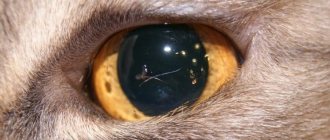Causes
Our extremely unfriendly environment is full of possible helminthiasis pathogens.
Thus, there is absolutely no guarantee that you or your pet will not pick up these unfortunate parasites sooner or later. ATTENTION! Sometimes even those cats that are never outside at all (it would seem that they cannot become infected with worms from the outside) often suffer from helminthiasis.
In what other ways can helminthiasis occur?
- Through raw seafood or meat;
- Parasitic insects present in the coat are carriers of helminths;
- Infection through other infected animals;
- Contact with objects where there are traces of parasites (their eggs, etc.);
- Through eating the feces of an animal suffering from helminthiasis.
If a pregnant cat has worms, what should you do in this case? You have 2 choices:
- Go to the veterinarian and let him take care of the animal.
- Start poisoning the worms yourself.
If you decide to take control of everything, then first of all you need to be careful and not resort to overly radical methods, because excessive zeal can negatively affect both the health of the pregnant furry pet and the condition of her unborn kittens.
Where could the animal become infected?
Of course, it is best if the cat is dewormed (treated against helminths) before mating. Many experienced owners do just that. But there are often cases when a pet becomes infected already during pregnancy.
The most common infections in cats are nematodes (roundworms), cestodes (tapeworms), as well as hookworms and whipworms.
Worms (helminths) enter the body as follows:
- with food (raw fish, raw meat, etc.);
- with water (unfiltered water, from a river, lake, puddle);
- upon contact with an infected animal;
- through feces;
- from a person;
- through external parasites (cat fleas);
- through shoes, clothes, objects (brought in from the street).
Thus, a pet that never walks outside can be exposed to infection.
We recommend reading the article on how to remove fleas from a pregnant cat. From it you will learn about the symptoms of the presence of “living creatures”, the rules for treating a pregnant cat against fleas, and means for controlling fleas.
Symptoms
At first, damage by parasitic worms resembles an infectious disease. So don’t get carried away with medications if you are not 100% sure that your pet has worms.
What signs indicate the presence of worms in a cat’s body:
- upset stomach (sudden diarrhea or constipation);
- Constant vomiting;
- Darkening of feces;
- Weight loss (the cat eats poorly and literally melts before our eyes);
- Presence of blood and mucus in the stool;
- Labored breathing; the pet makes sniffling/sniffling sounds;
- High fatigue, lethargy, weakness, loss of interest in active games;
- A sharp decrease in appetite, followed by insatiable hunger;
- Bloating;
- The presence of helminths in feces;
- Tearfulness, suppuration of the eyes, blurred vision;
- Decreased immunity;
- Dulling and hair loss;
- In more advanced cases, seizures occur.
It is necessary to treat worms in a pregnant cat, otherwise the parasites can cause premature birth.
The body of a pregnant cat is already very susceptible to unfavorable factors, and helminths can even more so undermine not only her health, but also jeopardize the survival (development) of the offspring. For more effective disposal, you need to know how to remove worms correctly.
Is it possible to treat a pregnant cat for worms: the use of medications and other means
Helminthiasis is a common disease in domestic animals. This condition is very dangerous and can cause various complications.
Often, after mating, a cat becomes infected with parasites, so many animal owners are interested in the question of whether it is possible to deworm a pregnant cat, what to do in this case, and how to properly carry out treatment during the period of gestation.
The answers to them can be found in this article.
Antihelminthic therapy for a pregnant cat
It is impossible to unequivocally answer the question of whether it is possible to deworm a cat during pregnancy. The decision is made by the veterinarian.
On the one hand, if you worm an animal in this position, it can cause dangerous consequences, including miscarriage. Toxic components included in many medications provoke birth defects in future offspring.
Pregnancy of an animal is a contraindication for taking a number of anthelmintic medications.
On the other hand, the presence of parasites in a cat’s body during pregnancy is considered a dangerous condition. Helminthiasis leads to various health problems in the animal and its offspring.
Experts say: if there are few parasites and the pet does not show signs of pathology, then anthelmintic therapy can be performed later.
When a cat suffers from worms, it is accompanied by pronounced symptoms, so treatment for helminthiasis is required urgently.
A pregnant cat is dewormed, but it is necessary to select means that are harmless to the animal. When antihelminthic therapy is required and how to carry it out, you need to find out from a specialist.
Symptoms of worms
With a small number of worms in the animal’s body, symptoms of helminthiasis may be absent.
If there are a large number of worms, then this condition is accompanied by the following symptoms:
- loss of appetite;
- changes in the color and concentration of feces;
- vomit;
- defecation disorder;
- the occurrence of constipation or diarrhea;
- grinding teeth in sleep;
- breathing problems;
- weight loss;
- eye problems;
- sleep disturbance;
- dullness and hair loss;
- the presence of mucus and blood in feces, traces of parasites;
- lethargy of the pet.
With helminthiasis, the animal refuses to eat and loses interest in its favorite activities.
Worms in a cat's body weaken the immune system, making the animal susceptible to infections and colds.
These symptoms are considered dangerous and require immediate treatment. In addition, intoxication is possible, which provokes the death of kittens in the womb. An animal can die from a large number of parasites in its body.
Actions for helminthiasis
Therapy can be carried out at home, using special drugs that are safe for offspring, or the animal can be treated under the supervision of a veterinarian.
Anthelmintics are available that can be used during pregnancy . They must be given to your pet strictly as directed and in a certain dosage.
In the absence of symptoms indicating worms, treatment is postponed.
Features of anthelmintic during pregnancy
During cat pregnancy, antiparasitic therapy should be carried out following the following recommendations:
- It is not allowed to deworm an animal in the first weeks after conception.
- Treatment is carried out under the supervision of a veterinarian.
- For therapy, drugs are selected whose use is not a contraindication for cat pregnancy.
- Deworming is carried out if the animal exhibits pronounced symptoms of the presence of parasites.
- An anthelmintic should not be given a few weeks before delivery.
- Deworming tablets are used strictly for their intended purpose.
Before using any drug to get rid of parasites, the cat owner should consult a veterinarian.
What means can be used
You can give your cat anthelmintic drugs as follows:
- Profender;
- Drontal;
- Paracide;
- Dirofen.
These remedies will help get rid of helminths quickly and safely.
Effective drugs
It is good to treat with the following drugs:
- Profender. This medicine can be used to treat a cat before mating. It can also be used several weeks before lambing. It is not recommended to give the drug to the animal just before delivery.
- Drontal. Treatment with these tablets is carried out in the second half of pregnancy, 2 weeks before the expected date of birth.
- Dirofen. It is a frequently prescribed drug for helminthiasis in cats. It should be used strictly according to the instructions.
These medications are effective against worms and cause virtually no adverse reactions. No teratogenic effects on offspring were observed with their use.
These drugs do not kill kittens if used in appropriate doses.
Prohibited drugs
It is not allowed to give your cat the following antihelminthic medications during pregnancy:
- Polyverkan;
- Kanikquantel plus;
- Prazitel.
These drugs have a teratogenic effect on the fetus and can lead to the death of kittens.
In the first half of pregnancy, the animal cannot be treated with the following drugs:
- Dirofen;
- Dodo and other products for which the instructions for use indicate pregnancy as a contraindication.
Possible consequences for offspring
The use of anthelmintics can have a negative effect on the offspring. This is explained by the fact that the drugs are poisonous not only to parasites, but also to future kittens.
In some cases, treatment can lead to the death of kittens in the womb. This usually happens when illegal drugs are used .
Miscarriage in a cat is another dangerous consequence of antiparasitic therapy.
Rarely, offspring may be born with any abnormalities and deformities.
When is it better to refrain from using medications?
There are periods when deworming a pet is strictly prohibited.
These include:
- three weeks after mating;
- fourteen days before the expected lambing date.
Veterinarians consider the optimal period for anthelmintic therapy to be 1.5 months after mating.
The danger of worms during pregnancy
Parasites in an animal’s body cause a weakening of the immune system, so the offspring may be born weak and sick. Most often, kittens are born with inflamed and purulent eyes.
Severe helminthic infestation is considered particularly dangerous . In this case, the parasites release a large amount of their metabolic products, which leads to severe intoxication. This often ends in death.
Features during pregnancy
Manufacturers of anthelmintic drugs do not recommend using them on pregnant or lactating animals. The point is not that this will affect the effectiveness of the drug (on the contrary, it will be just as effective), but rather because of side effects that in utero can negatively affect the offspring.
IMPORTANT! If helminthiasis does appear, but its consequences are not so significant, it is better to wait until childbirth, and only then, with the recommendation of a veterinarian, begin deworming.
In emergency situations, when treatment can no longer be delayed, it is simply necessary to deworm the pregnant cat. Then you need to know when, at what time and under what circumstances it should be done most correctly.
Do not neglect visiting a specialist, because only he can advise on the safest and best way to get rid of parasites. The most favorable time is considered to be approximately 40 days after pregnancy (3rd trimester).
Remember that it is a priori unsafe to deworm a pregnant cat, since anthelmintics are antiparasitic poisons whose purpose and active action are aimed at destroying worms.
And, often, they work effectively, but this certainly affects the condition of developing kittens, and not in the most positive way (up to the formation of mutations and the appearance of other abnormalities). Once in the body, the product begins to actively destroy adult parasites and their eggs located in the animal’s digestive system.
It is recommended to take antihelminthic drugs in two stages. The second portion is always taken after 2 weeks, since there is a possibility that not all eggs will be destroyed - new parasites that are not yet able to reproduce will hatch from them.
Carry out this procedure before conception - this way the toxicity of the drugs will not cause fatal consequences to the offspring during further pregnancy.
Features of nursing
Before deworming a pregnant/nursing cat, the owner rids it of ectoparasites. Otherwise, the treatment will not have an effect. A good solution is to use the drug to simultaneously destroy external and internal pests. For example, drops on the withers of Stronghold.
The medicine is given to the pet according to the instructions attached to it. It is also important to follow the dosage. The cat must swallow the tablet completely. To prevent her from spitting out the medicine, the following methods are used at home:
- The crushed tablet is mixed with a small volume of the animal’s favorite food. A soft, moist dish of uniform consistency is ideal for this. For example, ready-made food: mousse, pate, jelly or homemade minced beef or chicken.
- The crushed tablet is mixed with a small volume of milk. Then the liquid is injected behind the animal’s cheek with a syringe without a needle. Next, the owner must hold the cat’s mouth until it swallows the solution.
If the cat scratches or breaks out, wrap it in a towel first.
- You can use a tablet dispenser (piller). It is sold in veterinary pharmacies. The device looks like a syringe with a rubber tip. The tablet is attached to the piller clamp, and the owner opens the cat’s mouth. Next, he places the tip at the root of the animal’s tongue and, pressing the piston, rolls out the medicine. After this, he closes and holds the pet’s mouth.
For greater effectiveness, deworming is performed again. This is done after 7-14 days, which depends on the type of medicine and the severity of the lesion.
Helminthiasis in a pregnant cat is dangerous not only for her, but also for her future offspring. Therefore, it is best to treat it before mating the animal. When there is a suspicion of parasite infection, tests are taken from the pet. The veterinarian decides what to prescribe for a pregnant cat against helminths, taking into account the stage of pregnancy, the type of parasites and the severity of the infestation.
Treatment
Due to possible negative consequences, it is important to approach the choice of an antiparasitic agent very carefully. Many veterinarians recommend using Paracid, Drontal or Dirofen. These products will not cause “damage” to developing kittens, and are guaranteed to cleanse the adult cat’s body of parasites.
Manufacturers claim that these products:
- Safe for pregnant pets and their future offspring;
- Effectively and delicately cleanse the body of parasitic worms, as well as their larvae and eggs;
- Convenient to use - some products are sold in 2 versions: in liquid form in the form of a suspension (which also comes with a convenient syringe) and in tablet form.
Moderate use of these drugs is approved by experts. The main thing is to follow the instructions and dosage.
Kittens, after birth, are extremely vulnerable and require a lot of protection from worms. To prevent infection, we recommend deworming them with a special agent on the 22nd day after birth.
ATTENTION! A kitten can become infected with helminthiasis while nursing the milk of an infected mother, and even during fetal development.
Disease prevention
It is worth noting that you cannot completely protect your cat from parasites, but you can really reduce the risk of infection by following preventive measures:
- regular cat deworming;
- Take your cat to the veterinarian once every six months;
- eliminate sources of infection;
- exclude raw meat, fish, and tap water from the diet;
- protect the cat from other animals;
- Clean your cat's things (tray, bowl, toys) regularly.
By following these rules, you can protect not only your cat, but also yourself.
Is it possible to worm a pregnant cat?
Christina: “Can a pregnant cat be wormed?”
It can be considered that pets are constantly at risk of infection with helminths, which is why regular deworming is so important. It is extremely important to do this before the cat becomes pregnant, otherwise helminthiasis will inevitably negatively affect the course of pregnancy, the condition of the mother cat and her numerous offspring.
Worms in a pregnant cat are a great health hazard, but they also need to be destroyed correctly so that your careless or unprofessional actions do not harm the animal and the babies.
The risk associated with helminths must be taken into account if the animal is to reproduce. Worms greatly weaken the body and reduce the mother’s immunity, so kittens can be born sick and weak. They often suffer from problems with the organs of vision - their eyes fester and become inflamed.
However, when asked whether it is possible to safely deworm a pregnant cat, veterinarians answer in the negative.
By their nature, anthelmintics are a poison that is aimed at poisoning the parasites living in the animal’s body. If the anthelmintic enters the digestive system, it kills adult worms, so it is recommended that you take the drug again approximately two weeks after the first dose.
During this time, the worm eggs have time to mature, and the next batch of parasites hatch from them, but they are not yet able to reproduce. The use of anthelmintic in two doses ensures the destruction of helminths in maximum quantities.
It is recommended to carry out this procedure before pregnancy so that toxic drugs do not affect the course of pregnancy, the health of the cat and the well-being of the offspring. If the deadlines were missed and the cat became pregnant while infected with worms, deworming is usually postponed until delivery.
In this case, worms are removed from both the cat and the kittens approximately six weeks after birth.
It is highly undesirable to give medicine to a nursing cat for various worms, as it passes into the milk and can greatly harm the kittens.
Exceptions
There are exceptions to all rules. In cases where there are a lot of worms and they can threaten the life of the mother and her offspring, under the supervision of a veterinarian and on his recommendation, special preparations are used, the instructions for use of which indicate that they are approved for use in pregnant cats.
These are products such as Drontal and Dirofen. They can be given in the second half of the term, but no later than one and a half months after the moment of conception.
The drug "Profender" can be used from the moment of mating, but no later than 20 days before the planned date of birth. So the correct answer to the question whether it is possible to deworm a pregnant cat should be: it is possible, but only based on vital signs, with the right drug and under the supervision of a veterinarian.
When the owners notice that a pregnant cat has worms, they should not take any measures on their own, but rather take the pet to a veterinarian. Deworming of animals is a mandatory procedure that breeders must carry out without fail before mating, but if the animal becomes infected after mating, then the decision to poison the worms should be made exclusively by the veterinarian. Pregnancy is not the best time to take strong medications, therefore, the less toxic influence on the body of a pregnant female, the more reliably the health of kittens in the womb will be protected.
Possible consequences for offspring
The use of anthelmintics can have a negative effect on the offspring. This is explained by the fact that the drugs are poisonous not only to parasites, but also to future kittens.
In some cases, treatment can lead to the death of kittens in the womb. This usually happens when illegal drugs are used .
Miscarriage in a cat is another dangerous consequence of antiparasitic therapy.
Rarely, offspring may be born with any abnormalities and deformities.
When is it necessary to worm?
It is not recommended to poison worms in a nursing cat or during pregnancy, but in exceptional cases deworming is simply necessary. It is necessary to treat a purr for worms in such an interesting situation if “uninvited guests” prevent the pets from living normally and raising future offspring. Therefore, it will be necessary to immediately remove worms from the body of your four-legged pets if the following negative changes are observed:
- the condition of the purr has noticeably worsened;
- lost interest in food;
- digestion is disrupted;
- helminths can be traced in the feces.
In addition, you will need to urgently deworm a pregnant cat that is suffering from a debilitating cough, and also if there is intense hair loss, increased lacrimation, skin itching and the animal, lying on the floor, crawls on the pelvic part, which indicates itching in the anal area. In addition, itchy discomfort in the anus can be caused by maggots, which are extremely rare in cats.
Only a specialist can confirm or deny the presence of parasites.
But it is impossible to independently determine the presence of worms and whether your pet needs to be wormed. Many of the listed signs can easily be confused with other pathologies, in particular, a lack of vitamins in the body, chronic intoxication and diseases of the internal organs. Therefore, before starting treatment for a cat before birth and if a helminthic infestation is suspected, you need to show your four-legged pet to a veterinarian. An employee of the veterinary clinic will conduct the necessary laboratory tests and only after identifying the type of parasite, will he recommend how to remove them correctly so as not to harm the purr with the kittens inside.
Signs of helminthiasis
You can suspect the presence of internal parasites based on the following external symptoms:
- indigestion (vomiting, diarrhea, constipation);
- frequent cough;
- changes in appetite (poor or increased appetite, perverted appetite);
- crawling of the animal on the floor on the pelvic part (itching in the anus);
- dull fur that sticks out on end;
- hair loss;
- blood and mucus in feces;
- mucous discharge from the eyes and nose;
- skin itching;
- allergic reactions;
- emaciation;
- sluggish, apathetic state of the animal.
It is impossible to independently determine the presence of helminthiasis, much less recognize the type of parasite. The above signs can easily be confused with the symptoms of many diseases (vitaminosis, diseases of internal organs, chronic intoxication, etc.). Therefore, if you suspect a helminthic infestation, you should contact a veterinarian.
After a professional examination, the pet will undergo the necessary diagnostic tests (analysis of feces, urine, biochemical and clinical blood tests, etc.). A diagnosis indicating the type of helminthiasis can only be made in a veterinary clinic after laboratory tests.
After identifying the parasite that has infected the animal, the veterinarian will advise how to remove worms from a pregnant cat and not harm the animal.
Veterinary medications for helminths: is it possible or not for pregnant females?
The selection of drugs for therapy is carried out only by a veterinarian.
Giving cats anti-worming drops or tablets should only be done at the discretion of the veterinarian, so that it does not happen that the pet is wormed and only worsens its condition. Therefore, a procedure aimed at destroying helminths must be done exclusively with medications prescribed by a veterinarian. Anthelmintics are poisons that poison the parasites that live in the cat's body, but they can also cause intestinal disorders, changes in blood patterns and a number of other side effects. Therefore, for pregnant cats, deworming medications should be the most gentle. During this wonderful period, medicines that have a toxic effect on the embryo and provoke a failure in development and even the death of embryos are strictly prohibited. These include:
- "Milbemax";
- "Vermidin";
- "Kaniquantel+";
- "Prazitel."
Safe veterinary drugs
If it is necessary to deworm a pregnant cat, it is better to use the medical product Drontal. Its dosage depends on weight, so for purrs with a body weight of 4 kg, 1 tablet is prescribed once. medications. If desired, the treatment is repeated. It is better to feed Drontal not in the evening, but in the morning during breakfast, mixing the pill into food. Another safe medicine for pregnant females is Profender, which is suitable from the first days of pregnancy, but is not permissible in the last month of gestation.
It is important for cat breeders to remember that during gestation, especially during anthelmintic therapy, purrs need maintenance therapy more than ever. An effective medicinal product "Calcidi", which is a vitamin and mineral supplement consisting of calcium, phosphorus, vitamin D. The medical product is useful during pregnancy because it eliminates stress conditions, prevents abnormal bone development and generally improves the health of the cat.
Prevention
Helminthic infestation in animals is excluded by careful adherence to preventive measures:
- It is recommended to give antihelminthic drugs to your pet every 3 months. This will not cause harm to the animal’s body, because drugs are given in small doses.
- Meat and fish products should be excluded from the cat’s diet, and drinking water should be settled or boiled.
- It is recommended to protect your pet from contact with street animals.
- Regular treatment of the animal's sleeping place and its tray with special anti-worm products will protect your pet from parasites.
- It is recommended to regularly clean the room where the cat lives using chlorine-based products.
Preventative measures to protect a pregnant cat from helminths are important because... During this period, there is a high probability of intrauterine transmission of parasites to kittens.
Worming a cat is the main task of the owners in order to protect it from parasites, maintain the health of the offspring and ensure their full development. And in order to avoid the harm of deworming, the drugs must be chosen correctly and the instructions must be strictly followed.
All information posted on the site is provided in accordance with the User Agreement and is not a direct instruction to action. We strongly recommend that before using any product, you must obtain a face-to-face consultation at an accredited veterinary clinic.
What worms can a pregnant cat have?
Parasites such as round, flat, and tapeworms live in the body of animals. If a cat develops symptoms of helminthiasis during pregnancy, these may include:
- toxocara - animal roundworms, up to 5 cm long, multiply quickly, can cause intestinal rupture, the likelihood of intrauterine infection of kittens;
- hookworms are small worms that feed on blood cells in the intestines, cause bloody diarrhea, and are able to penetrate the skin and placental barrier;
- cucumber tapeworm - transmitted by fleas, reaches a length of up to 1.5 m, is firmly attached to the intestinal walls, lives for many years without signs of invasion;
- liver fluke - lives in the tissues of the liver, gall bladder, pancreas, transmitted through infected fish;
- wide tapeworm - infection occurs through water, crustaceans, fish, in the intestines of a cat it grows up to 1.5 m, parasitizes asymptomatically;
- pulmonary fluke - trematodes that live in the respiratory organs, form cysts, feed on parenchyma cells, and destroy the lungs;
- alveococci are small worms; large colonies form tumor-like cysts in various organs (liver, lungs, heart, brain).
Worms in a pregnant cat
Symptoms of animal infestation with worms
Signs of helminthiasis in a pregnant cat that appear most often:
- Problems with digestion and functioning of the gastrointestinal tract. This may be: vomiting, constipation, followed by diarrhea at the tray, refusal to eat, or an abnormally increased appetite;
- Regular cough in the form of attacks. It appears especially often when infected with roundworms;
- Yellowed mucous membranes, enlarged liver;
- Anemia (anemia). Its characteristic signs: weakened state of the animal, drowsiness, fatigue;
- Standing on end, faded, falling out hair (especially in the anal area);
- Itching and small rash around the anus;
- Abundant purulent, lacrimal, mucous discharge from the nose and eyes;
- Blood clots in the stool after bowel movements;
- Abdominal enlargement that is abnormal even for pregnancy;
- In severe or advanced cases, the animal develops intoxication. It leads to failure of the hind legs and miscarriages.
Many signs of helminthic infection (infestation) are similar to manifestations of diseases of viral and bacterial etiology. If you worm a pregnant cat yourself, its condition will worsen. Which in severe or advanced cases leads to the death of the animal.
It is possible to accurately diagnose helminthiasis only with the help of clinical laboratory tests. They are prescribed by a veterinarian after examining the animal.
Why are helminthiasis dangerous?
Worms in a pregnant cat most often do not have a serious impact on the life and health of the animal, as well as the offspring. Direct intrauterine infection of embryos from the mother does not occur. In rare cases, as a result of a sharp excess in the number of larvae and adults, sad consequences are observed:
- premature birth, miscarriages;
- intrauterine fetal death;
- congenital developmental pathologies of kittens;
- intoxication of the mother's body;
- anemia, decreased cat immunity.
The danger comes from the waste products of worms, which poison the host’s body. Growing colonies of parasites interfere with the normal nutrition of the pregnant cat and kittens. They do not receive enough nutrients, which can affect their physical performance (they are born premature, weakened, and developmentally delayed).
On a note!
Most often, kittens become infected from an infected mother immediately after birth. With milk, through licking and close physical contact, eggs, larvae and adult worms pass to the offspring.
What to do
If you observe symptoms such as::
- lethargy;
- lack of appetite;
- increased aggression and irritability;
- atypical behavior.
Then it is worth contacting a veterinarian and diagnosing a disease such as helminthiasis. Removing worms from a pregnant cat is quite simple. The main thing is not to carry out this procedure in the first half of pregnancy, as this can directly affect the health and development of kittens.
also not recommended to treat the animal for worms if more than 6 weeks have passed since mating , as this can cause premature birth and fetal death. After she has lambed, when the permissible period has reached, it is recommended to treat not only the pregnant cat, but also newborn kittens in order to prevent the spread of worms throughout the body. Of course, timely prevention of worms in a pregnant cat is necessary in order to prevent the appearance of worms and not to give the pregnant cat medications that can affect not only her health, but also the health of her future offspring.
It is recommended to poison a pregnant cat with worms with extreme caution and with the use of drugs that will be selected by a veterinarian, based on the types of worms that were diagnosed in the pregnant cat, and taking into account the length of pregnancy, the general condition of the pet, the degree of damage to the body and the state of the immune system.
Treatment methods
What to do if a cat becomes infected with worms while bearing cubs, the veterinarian decides. Based on the duration of pregnancy, the degree of damage, and the condition, the doctor chooses the optimal treatment regimen. Treatment is carried out only after an accurate diagnosis. If the gestational age is not established, then they wait until birth and then deworm the mother and kittens.
Drug therapy
Almost all anthelmintic drugs have embryotoxic and teratogenic properties. Their incorrect use leads to the death of embryos and fetuses. If there is an urgent need to remove worms from a pregnant cat, then treatment is carried out no earlier than 6 weeks. All antihelminthic medications are prohibited from being used in the first half of pregnancy.
Drugs for treating a pregnant cat
What medications can pregnant cats use:
- Milbemax – tablets;
- Gelmimax-4 – tablet form;
- Profender - drops for application to the withers;
- Dirofen – tablet form and paste;
- Prazitel - pills and suspension in a syringe dispenser;
- Trontsil-K - tablets 2 weeks before birth.
On a note!
Giving deworming tablets to a pregnant cat is only possible in exceptional cases. Before treatment, the pet is carefully weighed and the exact dosage is determined. In case of overdose, side effects are possible in the form of vomiting, diarrhea, bloody feces, vomiting. At the first signs of poisoning, the help of a veterinarian is necessary.
Folk remedies
You can poison a pregnant cat with worms using non-traditional means. When used wisely, they are safe, non-toxic and harmless to the animal and offspring. The most common methods include:
- grind 5 g of raw peeled pumpkin seeds, add the resulting powder to the cat’s food, repeat for 5-7 days;
- add 5 g of tansy flowers to 200 ml of boiling water, leave for 1 hour, drink the resulting decoction 2-3 times a day from a syringe without a needle (single dose - 2.5 ml) for 1 week;
- pour 1 tbsp of onion cut into four. Give the cat warm water and the infusion twice a day on an empty stomach for 1 week;
- feed the animal daily before meals with one crushed clove of garlic for 7-10 days, repeat after a week if necessary;
- Give alcoholic tincture of wormwood to drink - twice a day, at least 10 drops at a time.
Treatment of a pregnant cat with folk remedies is carried out under medical supervision. To avoid negative consequences, carefully calculate the single dose and determine the duration of therapy. At the slightest sign of intolerance, stop taking the drug.
Useful materials:
- The cat has cancer Stages of mammary gland cancer in cats Like in humans, cat mammary cancer has ...
- Cutaneous horn General description of the disease Cutaneous horn on the forehead or face (ICD 10 code - L57.0) -...
- Itching and odorless discharge Main causesBefore considering the factors that provoke the appearance of discharge that has a sour odor, it is necessary to immediately note...
- Normal temperature in animals Normal temperature in different types of animals Veterinary services Day hospital for animals Veterinary certificates Vaccination…
Prohibited drugs
It is not allowed to give your cat the following antihelminthic medications during pregnancy:
- Polyverkan;
- Kanikquantel plus;
- Prazitel.
These drugs have a teratogenic effect on the fetus and can lead to the death of kittens.
In the first half of pregnancy, the animal cannot be treated with the following drugs:
- Dirofen;
- Dodo and other products for which the instructions for use indicate pregnancy as a contraindication.
Treatment: medicines and folk remedies
If your cat is in the second trimester of pregnancy, your doctor may prescribe a standard medication to eliminate the worm infestation. When kittens are fully formed and strong, they can tolerate intoxication associated with taking anthelmintic drugs.
Note! Stronghold has no analogues, which is why its price is so high. If your doctor prescribes a drug with standard active ingredients, he or she should tell you about the risks.
In the first half of pregnancy, folk remedies can be used to treat tapeworms in cats. A folk remedy known for many years for tapeworms and flatworms is pumpkin seeds. The raw seeds are cleaned, crushed to a pulp, mixed with lard and given to the cat in the morning on an empty stomach (5-7 grams each) for 5-7 days.
Tablets and suspensions for worms
Standard deworming medications include tablets and suspensions that contain two active ingredients. One of the substances is aimed at combating round parasites, the second destroys tapeworms. Tablets and suspension are dosed strictly by weight and taken in the morning, before meals.
When using tablets and suspensions to eliminate worms, a pregnant cat may experience an allergic reaction, excessive secretion of foamy saliva, temporary apathy, nausea and diarrhea. To avoid overdose, doctors usually advise calculating the dose of the drug based on the cat’s weight before pregnancy.
Drops for worms in a pregnant cat
Anti-worm drops, unlike suspensions or tablets, may have a wider spectrum and contain a third active ingredient. Most drugs contain fipronil or ivermectin as an additional active ingredient.
Considering the toxicity and the predicted burden on the body, the use of complex drops for prophylaxis in a pregnant cat is not recommended by doctors.
However, if the predicted therapeutic effect exceeds the possible risks, therapy is still carried out.
For example, if a pregnant cat comes from the street to the veterinarian and is infected with several types of helminths, fleas and ticks, it is wiser to take a risk and rid the cat of parasites.










